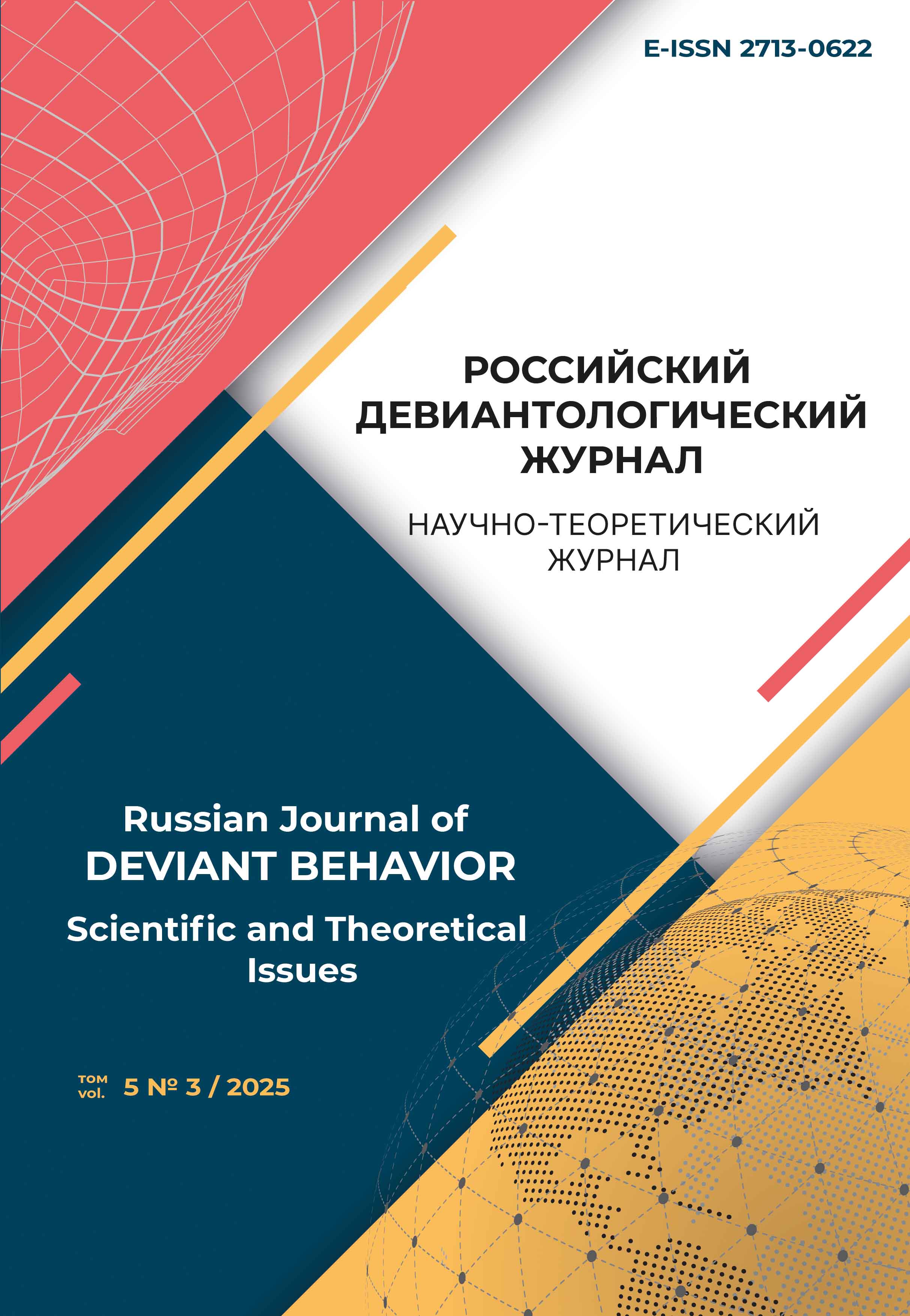St. Petersburg, St. Petersburg, Russian Federation
Sankt-Peterburg, Russian Federation
UDC 159.9
Introduction. The article deals with the problem of measuring the informational and psychological vulnerability of law enforcement officers on a continuum “resilience – vulnerability” drawing on empirical data. This decline in informational and psychological resilience leads to increased vulnerability and victimisation in the information space of service activities, reducing the quality of operational and service activities. Early psychodiagnostics makes it possible to take timely measures to increase resilience and prevent informational and psychological vulnerability and victimisation. The authors’ scale “Informational and Psychological Vulnerability of the Individual” is proposed for this purpose. The main aim of the scale is to assess susceptibility to informational influence (direct and/or indirect) on a continuum of “resilience-victimisation”. The questionnaire consists of a set of 13 items, each of which is rated on a five-point scale (where 1 means “strongly disagree”, 5 means “strongly agree”). The final score for the scale is calculated by adding up the scores for all items in the questionnaire. Depending on the expressiveness of the final indicator, the level of informational and psychological vulnerability is assessed on a continuum “resilience – victimization”. The higher the score, the more the assessments deviate towards victimisation; low values indicate informational and psychological resilience. Research methods. Correlational and comparative analysis. Assessment of retest reliability, as well as construct and criterion validity. Results. The ‘Information-Psychological Vulnerability of the Individual’ scale requires minimal time to be conducted and processed, and can be used in various situations, both for practical and research purposes. The presented scale corresponds to the basic psychometric requirements for the development of professional psychological tests. The developed scale should be used to prevent information and psychological vulnerability and victimisation within the framework of moral and psychological support for the activities of internal affairs officers.
informational and psychological resilience, vulnerability, victimisation, psychometrics, psychodiagnostics
1. Astahova, A. A., Koshkarova, Yu. A. (2019). Formirovanie psihologicheskoj ustojchivosti sotrudnikov organov vnutrennih del k destruktivnym informacionnym vozdejstviyam kak sostavlyayushchim professional'nogo masterstva. Azimut nauchnyh issledovanij: pedagogika i psihologiya, 8 (3 (28)), 25–27.
2. Baranov, E. G. (2017). Informacionno-psihologicheskaya ustojchivost': sushchnost' i psihologicheskoe soderzhanie. Teoreticheskaya i eksperimental'naya psihologiya, 10 (1), 58–64. EDN: https://elibrary.ru/ZGZNUZ
3. Baturin, N. A., Vuchetich, E. V., Kostromina, S. N., Kukarkin, B. A. i dr. (2015) Rossijskij standart testirovaniya personala. Organizacionnaya psihologiya, 5 (2), 67–138. EDN: https://elibrary.ru/UKQHZV
4. Bobrov, A. E., Fajzrahmanova, E. V. (2017). Oprosnik kognitivnyh oshibok kak instrument ocenki komponentov patologicheskoj trevogi. Doktor.Ru, 8 (137), 59–65. EDN: https://elibrary.ru/ZXWOQJ
5. Vinogradov, M. V., Ul'yanina, O. A. (2020). Psihologicheskie aspekty informacionnogo vozdejstviya na sotrudnikov organov vnutrennih del. Psihologiya i pravo, 10 (1), 8–29. DOI: https://doi.org/10.17759/psylaw.2020100102; EDN: https://elibrary.ru/KCYCEL
6. Vladimirova, M. B. (2015). Informacionnoe vozdejstvie: mekhanizmy i zashchita. Vestnik Chelyabinskogo gosudarstvennogo universiteta. Filologiya. Iskusstvovedenie, 5 (360), 64–70. EDN: https://elibrary.ru/TQSSPD
7. Vorob'eva, I. V., Kruzhkova, O. V. (2016). Aksiologicheskaya gotovnost' molodezhi k informacionnomu vozdejstviyu interneta. Pedagogicheskoe obrazovanie v Rossii, 10, 85–91. DOI: https://doi.org/10.26170/po16-10-14; EDN: https://elibrary.ru/XACBUX
8. Duhnovskij, S. V., Shelepina, E. K. (2024). Oprosnik «Sub"ektivnaya ocenka urovnya utomlennosti lichnosti»: razrabotka, psihometricheskaya harakteristika, primenenie. Rossijskij deviantologicheskij zhurnal, 4 (2), 144–160. DOI: https://doi.org/10.35750/2713-0622-2024-2-144-160; EDN: https://elibrary.ru/OVZKFN
9. Duhnovskij, S. V., Zlokazov, K. V. (2024). Informacionno-psihologicheskaya uyazvimost' sotrudnikov organov vnutrennih del raznym urovnem ustojchivosti i utomlennosti. Psihologiya i pravo, 14 (4), 50–67. DOI: https://doi.org/10.17759/psylaw.2024140404; EDN: https://elibrary.ru/WBUMHX
10. Karayani, A. G. (2022). K voprosu ob informacionno-psihologicheskoj ustojchivosti sotrudnikov organov vnutrennih del. V Yu. A. Sharanov (red.), Aktual'nye problemy psihologii pravoohranitel'noj deyatel'nosti: koncepcii, podhody, tekhnologii (Vasil'evskie chteniya-2022): materialy mezhdunarodnoj nauchno-prakticheskoj konferencii (Sankt-Peterburg, 15 aprelya 2022 goda, str. 282–287). Saint Petersburg: Sankt-Peterburgskij universitet Ministerstva vnutrennih del Rossijskoj Federacii.
11. Kasyuk, A. Ya. (2021). Informacionno-psihologicheskoe vozdejstvie v informacionnom protivoborstve. Vestnik Moskovskogo gosudarstvennogo lingvisticheskogo universiteta. Obshchestvennye nauki, 1 (842), 22–34. DOI: https://doi.org/10.52070/2500-347X_2021_1_842_22; EDN: https://elibrary.ru/FDTSUP
12. Kulikov, L. V. (1997). Psihologiya nastroeniya. Saint Petersburg: Izdatel'stvo Sankt-Peterburgskogo universiteta.
13. Kuprejchenko, A. B. (2008). Psihologiya doveriya i nedoveriya. Moskow: Izd-vo «Institut psihologii RAN». EDN: https://elibrary.ru/QCTDHR
14. Pulko, T. A., Kivajko, V. N. (2024). Informacionnye manipulyacii i psihologicheskaya uyazvimost' v usloviyah krizisnoj informacionnoj sredy. Endless Light in Science, S1, 151–154. DOI: https://doi.org/10.24412/2709-1201-2024-23-151-154; EDN: https://elibrary.ru/VLNQNM
15. Fer, R. M., Bakarak, V. R. (2010). Psihometrika: Vvedenie. (per s angl. A. S. Naumenko, A. Yu. Popova; pod red. N.A. Baturina, E.V. Ejdmana). Chelyabinsk: Izdatel'skij centr YUUrGU.
16. Friman, A., Devul'f, R. (2011). Desyat' glupejshih oshibok, kotorye sovershayut lyudi. Saint Petersburg: Piter. EDN: https://elibrary.ru/PGCNKQ














